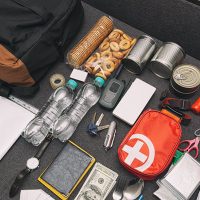5 Ways To Get Your Home Prepared For Hurricane Season

Everybody in Florida knows when hurricane season is, and what damage these storms can bring. Yet, each year, thousands of Floridians get caught flat-footed by severe storms and their aftermath. A storm’s devastation is made worse when people are left stranded or suffering without power, water, and food in their own homes. The best way to avoid a worst-case scenario is to plan and prepare for it. The State of Florida recommends that homeowners take several hurricane preparedness measures, such as:
- Prepare a Hurricane Kit
A kit of important supplies can be critical when a storm is approaching. Whether you are required to evacuate or can remain in your home, you want to be prepared with a supply collection that is easily accessible and ready to use. Often, when a storm is on its way people will begin to panic and buy up all supplies at local stores. You don’t want to find out too late that your local hardware stores are all out of flashlights, for example. Preparing an emergency kit while the situation is calm, well before a hurricane is forecast, can help you identify and collect everything you may need, such as:
- Water
- First-aid kit
- Prescription medications
- Personal hygiene items
- At least 3 days worth of non-perishable food
- Coolers and ice packs
- Manual, non-electric, can opener
- Flashlights
- Batteries
- Battery operated radio
- Waterproof container with cash and important documents
- Lighters and matches
- Books, magazines, games for recreation
- Children’s toys and other items for children in your household
- Pet supplies (dog food, cat food, cat litter, food dishes, etc.)
- Secure Your Home
- Cover and secure all windows with plywood or hurricane shutters. Plan ahead and have these materials on hand, along with tools, screws, and nails to attach them when necessary.
- Trim trees and shrubs on your property to minimize the prospect of broken limbs damaging or entering your home (or the property of others).
- Reinforce garage doors and roof materials when possible.
- Collect and store any loose items such as picnic tables, chairs, garbage can, and lawn decorations that are not secured to the ground.
- Prepare for Power Outages
You can do this by charging all phones and other handheld devices fully before the potential for a power outage caused by high winds. If your air conditioning loses power, try to close shades and prevent light and heat from entering the home as well as possible. Do not run battery-operated fans unless you are in the room, as these units can actually increase the temperature of a room.
Turn your refrigerator down as low as possible before the prospect of a power outage, and have coolers with ice packs ready to transfer food when the fridge gets too warm to safely store food. The CDC recommends monitoring food temperatures and drinking plenty of fluids while your power is out due to a storm.
If you are running a generator or cooking grill, run these outside to avoid the danger of carbon monoxide poisoning.
To prepare for a possible water shut-off, fill your bathtub prior to the storm and store as many containers of clean drinkable water available as you can.
- Save Gas and Cash
Fill your vehicle’s gas tank well in advance of an approaching storm, to avoid long gas lines or even outages at local pumps. Fill extra gas canisters that you can use in the event of an emergency that lasts several days.
Withdraw cash from your bank or ATM to keep on hand. Most of us rely on cards and other electronic payments now, but these systems can go haywire during an emergency. Many area businesses might find that their card readers and computer systems are down after a major storm.
- Keep an Emergency Contact List
You may have friends and neighbors that are willing to help – or may need help – during or after a hurricane. Make sure you have their contact information easily accessible in the event of an emergency.
In addition to the above, you want to be ready to document and identify all hurricane-related damage to start your property damage insurance claim after a storm. The sooner you can start your claim, the better. If you run into any unexpected problems with your insurer after a storm, an experienced Daytona hurricane damage attorney may be able to help you obtain a full and fair recovery.
Our Daytona, Florida Hurricane Damage Attorneys Can Help Homeowners after a Devastating Storm
The best – and only – thing homeowners can do during hurricane season is prepare for the emergency. Following critical safety guidelines and prepping your home for a storm can make a bad situation somewhat better. Sometimes, no matter what we do, there will still be problems – particularly during a hurricane damage claim with your insurance company. At Bundza & Rodriguez, P.A., our hurricane damage attorneys know what homeowners go through, and what tactics insurers may use to minimize or deny your claim. If disaster strikes, call our Daytona law offices at 386-252-5170, or schedule a consultation with our Daytona Beach property damage attorneys online.

